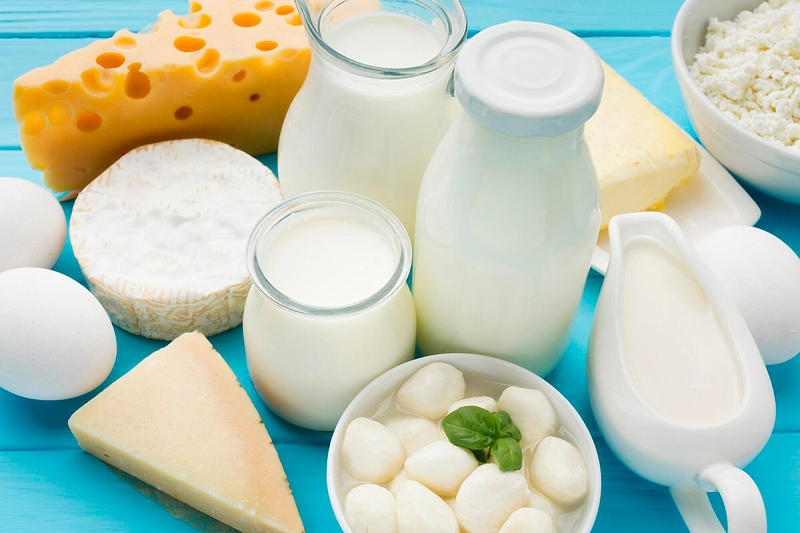As the seasons change and sniffles, snot, and coughs become commonplace, the last thing you might be thinking about is the impact of your diet on these symptoms.
Surprisingly, one source of antibiotics may be sneaking into your daily meals, affecting your immune system in unexpected ways.
Here are common questions regarding antibiotics getting into our diet:
- “What foods contain antibiotics?”
- “How bad are antibiotics for your gut?”
- “What happens to your body when you eat antibiotics?”
- “Which foods are treated with antibiotics?”
Let’s explore the connection between dairy consumption and antibiotics, and learn how making conscious choices about the dairy you consume can play a crucial role in your overall health.

The Dairy Dilemma: More than Just a Sniffle
This time of year, many of us are familiar with the discomfort of seasonal ailments — sniffles, snot, sneezes, and coughs.
While we may be quick to attribute these symptoms to external factors like weather or exposure to germs, the reality is that our diet could be playing a significant role.
One surprising culprit that often exacerbates respiratory issues is dairy.
Consuming dairy products, particularly in large quantities, can increase phlegm production.
The link between dairy and phlegm is something many of us can intuitively recognize — think about the heavy feeling in your throat after a glass of milk or a bowl of ice cream.
This heightened phlegm production can make respiratory symptoms more uncomfortable, especially during cold and flu seasons.

The Unseen Presence of Antibiotics
What might be even more surprising is the amount of antibiotics entering our systems through dairy.
It’s not the over-the-counter pills or prescription medications that you might associate with antibiotic intake.
Instead, the antibiotics find their way into our bodies through the dairy products we consume.
The antibiotics present in dairy originate from the treatment given to the animals producing the milk.
These antibiotics are then transferred to us when we consume products like milk, cheese, and yogurt.
This unintentional ingestion of antibiotics may have far-reaching consequences for our health.

The Pitfalls of Processed Proteins
Not all dairy is created equal, and the processing methods used in the production of dairy products can further complicate matters.
Many dairy items undergo extensive processing, resulting in the removal of essential nutrients.
When we consume these processed proteins, we may think we’re nourishing our bodies, but in reality, we could be overloading our systems with substances that do more harm than good.
The nutrient-stripped processed dairy not only fails to provide the necessary nourishment but can also contribute to a buildup of phlegm.
As I previously discussed, this excess phlegm puts additional strain on our immune systems, making it harder for our bodies to fight off infections and illnesses.

Taking Control: A Conscious Approach to Dairy Consumption
So, what can you do to mitigate the impact of antibiotics and processed dairy on your health, especially during the sniffle season?
The answer lies in making conscious choices about the dairy products you consume.
When respiratory symptoms arise, consider temporarily cutting out certain dairy items from your diet.
Cheese, cottage cheese, sour cream — these processed dairy products can be culprits in exacerbating phlegm production.
By eliminating or reducing your intake of these items, you can help prevent your system from getting bogged down and potentially provide relief to your immune system.
Moreover, if you choose to include dairy in your diet, opt for more natural and organic alternatives.
Look for organic, non-GMO products that explicitly state that they don’t contain antibiotics and hormones.
By being selective about the dairy you consume, you can significantly reduce the unintentional intake of antibiotics and hormones, safeguarding your gut health.

The Impact on Children
For parents, this awareness becomes crucial when it comes to the health of your children.
When kids experience sniffles or seem a bit run down, consider temporarily cutting dairy from their diet.
Replace processed dairy with cleaner, more natural, and organic options to ensure that their developing immune systems are not unnecessarily burdened by antibiotics and hormones.
By being proactive and selective in your dairy choices, you’re not only supporting your immediate well-being but also contributing to the long-term health of your children.
In Conclusion: A Mindful Approach to Dairy
In the midst of the seasonal challenges, it’s essential to consider the potential impact of dairy on our health.
Antibiotics sneaking into our systems through dairy may be an unexpected contributor to respiratory discomfort.
By making informed choices about the dairy products we consume — opting for natural, organic alternatives and cutting out processed options when necessary — we can help support our immune systems and overall well-being.
As we navigate the seasons and the accompanying sniffles, let’s not overlook the power of our dietary choices in promoting a healthier, happier life.








